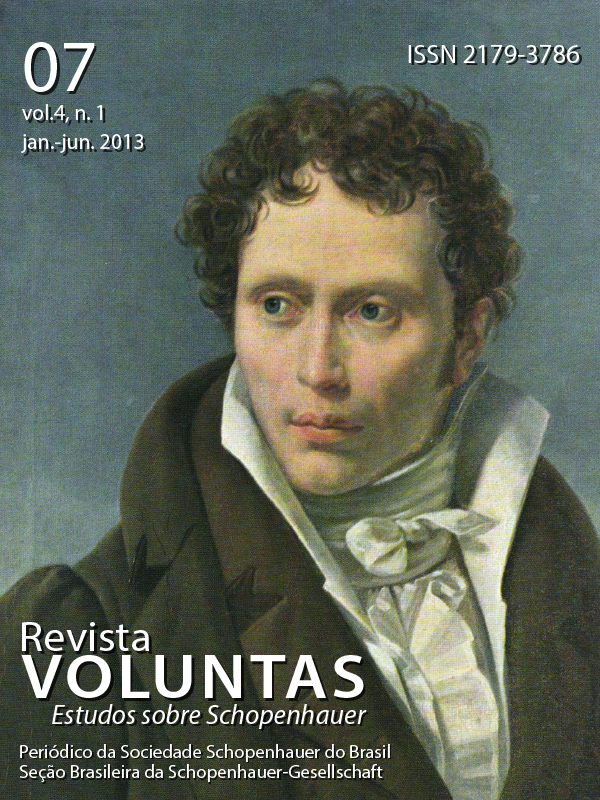Unconscious, intentionality and nature: the morganatic dialectic between naturalism and transcendentalism in Schopenhauer's metaphysics of will
DOI:
https://doi.org/10.5902/2179378633989Keywords:
Naturalismo, Transcendentalismo, InconscienteAbstract
Taking as inspiration the young Nietzsche's reception of the metaphysics of the will, the reflections presented in this work follow, from a systematic perspective, the diverse difficulties that Schopenhauer faces in an attempt to make the metaphysical assumptions of his philosophy of nature compatible with subjective idealism of Kantian character professed by him. The guiding thread of our investigation is the relationship between the notions of the unconscious, will, representation and nature. We intend to show that a consequent formulation of the naturalism involved in his theory of the degrees of objectification of the will requires an overcoming of the framework of Kantian subjective idealism towards an objective idealism. At the end of the work, we discuss some of Rudolf Malter's central theses about the place of transcendentalism in the Schopenhaurian system.Downloads
References
BARBERA, S. Eine Quelle der frühen Schopenhauer-Kritik Nietzsches. Rudolf Hayms Aufsatz „Arthur Schopenhauer“. In: SCHIRMER, A.; SCHMIDT, R. (Hrsg.) Entdecken und Verraten. Zu Leben und Werk Friedrich Nietzsches. Weimar: Verlag Hermann Böhlaus Nachfolger, 1995.
BRANDÃO, E. A concepção de matéria na obra de Schopenhauer. São Paulo: Humanitas, 2008.
GARDNER, S. Schopenhauer, Will, and the Unconscious. In: Janaway, C. (Hrsg.) The Cambridge Companion to Schopenhauer. Cambridge: Cambridge University Press, 1999.
GÖDDE, G. Traditionslinien des „Unbewußten“. Schopenhauer – Nietzsche – Freud. Gießen: Psychosozial-Verlag, 2009.
JANAWAY, C. Self and World in Schopenhauer's Philosophy. Oxford: Clarendon Press, 1989.
KANT, I. Kritik der reinen Vernunft. Hamburg: Felix Meiner Verlag, 1998.
LANGBEHN, C. Metaphysik der Erfahrung. Zur Grundlegung einer Philosophie der Rechtfertigung beim frühen Nietzsche. Würzburg: Königshausen & Neumann, 2005.
LOPES, R. Ceticismo e vida contemplativa em Nietzsche. Tese de doutorado. Belo Horizonte: UFMG, 2008.
MALTER, R. Arthur Schopenhauer. Transzendentalphilosophie und Metaphysik des Willens. Stuttgart – Bad Cannstatt: Frommann-Holzboog, 1991.
MALTER, R. Arthur Schopenhauer. Schopenhauers Transzendentalismus. In: Midwest Studies in Philosophy, 8, 1983.
NIETZSCHE, F. Werke. Kritische Gesamtausgabe (KGW). Bd. I/4. Hrsg. v. G. Colli und M. Montinari. Berlin. New York: Walter de Gruyter, 1995.
NIETZSCHE, F. Werke. Sämtliche Werke. Kritische Studienausgabe (KSA). Bd. 7. Hrsg. v. G. Colli und M. Montinari. Berlin: Walter de Gruyter, 1999.
SCHMIDT, A. Schopenhauer und der Materialismus. In: Schopenhauer-Jahrbuch, 58, 1977.
SCHMIDT, A. Physiologie und Transzendentalphilosophie bei Schopenhauer. In: Schopenhauer-Jahrbuch, 70, 1989.
SCHOPENHAUER, A. Sämtliche Werke. Hrsg. v. Paul Deussen. München: Piper Verlag, 1911-1926. (Werke auf CD-ROM: Schopenhauer im Kontext).
SCHOPENHAUER, A.O mundo como vontade e como representação. Trad. Jair Barboza. São Paulo: Editora Unesp, 2005.
Downloads
Published
How to Cite
Issue
Section
License
The submission of original manuscripts to this journal implies the transference, by the authors, of the copyrights for printed and digital publication. The copyrights of a published manuscript belong ultimately to the author, and only the copyright for its first publication is reserved to the journal. Authors may only use the same results in other publications explicitly indicating this journal as the medium of the original publication.
Licence
Attribution-NonCommercial-ShareAlike 4.0 International (CC BY-NC-SA 4.0) - This license lets others remix, tweak, and build upon your work non-commercially, as long as they credit you and license their new creations under the identical terms.






